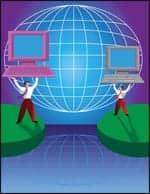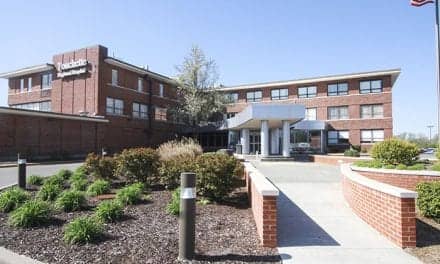Many sleep laboratories are finding that outsourcing sleep studies is benefiting their business. Is this approach for you?By Theresa Shumard, BA |
It is quite ordinary for businesses today to rely on outsourcing certain services. Outsourcing may allow for a reprieve from backup burdens and businesses being inundated with work that cannot be completed otherwise, in-house, in a timely manner. What may be less recognized is that some organizations regard outsourcing as a benefit because it is a way to enhance effectiveness by allowing them to focus on “what they do best.” As health care providers and business establishments, some sleep disorders centers have looked to outsourcing polysomnography record scoring for many of these same reasons.
Some sleep centers choose an outsourcing business model, hoping to ultimately increase service value, high-quality patient care, and profitability, and ease the workload for overworked staffs. “We do not send out 100% of our sleep studies, but utilize the outsourcing of sleep record scoring as a backup to the lab, and to cover staff vacations and sick leave,” said Mehran Farid, MD, a board-certified sleep physician from Peninsula Sleep Center in Burlingame, Calif.
As any medical facility that employs allied health workers, sleep laboratories must sometimes cut back on services due to workforce shortages. The workforce deficit dilemma in the United States has spurred leaders of the health care industry to continue to try to overcome challenges and create strategies to build a sustainable supply of health workers. According to the US Bureau of Labor and Statistics, a Centers for Medicare and Medicaid Services study suggested that 90% of all facilities employing health care workers will have inadequate staffing levels by the year 2030, primarily due to the high numbers of patients represented in an aging Baby Boomer population.
Not only does the United States face an increase in the need for more health care workers due to the Baby Boomers, sleep disorders facilities, in particular, may be facing this supply and demand dilemma because of the rapid growth of the sleep medicine industry. Some centers are reportedly faced with scaling back the number of sleep studies performed per night to combat technologist workforce shortages.
If a business is looking to transform itself, the organization may look to outsourcing as a driving force for a more dynamic core function. Or they may choose to use it as an instrument to increase flexibility in order to meet changing technologies, business conditions, consumer satisfaction, and demand for services.
TAKING THE ROAD LESS TRAVELED
The outsourcing model also has provided a dramatic increase in access to patient care in some cases, according to Debbie Lee, operations manager for TheSleepCenters, headquartered in Knoxville, Tenn, a Coile Inc company. “Outsourcing has allowed us to go where no one else goes,” Lee says. “If you’ve ever been to eastern Kentucky, you know that with the mountains and ‘hollers,’ it’s not widely traveled.” She explains that some areas where TheSleepCenters has facilities are densely populated; however, they are limited in health care resources due to the geographical terrain. In addition to Kentucky, the company also has sleep centers in Tennessee, Indiana, and Nevada.
“Because we outsource our sleep scoring, we have the benefit of being able to free up every available sleep tech to perform patient setup and acquisition of sleep studies. Our scoring is sent out to Cranberry Data Solutions (CDS),” she says. Lee further explains that in a number of areas where her company operates sleep facilities, there are few physicians and even fewer sleep technologists. “We have been able to reach patients we would never have been able to reach if we did our own scoring. We hire the few techs that are obtainable as we focus solely on patients in the remote areas so they end up being diagnosed and treated for sleep disorders.” TheSleepCenters currently owns 21 sleep laboratories, four having just opened their doors in June.
CDS, based in Freeport, Me, maintains a network of registered sleep technologists, according to Roy Whittaker, president. “Two of our board members are registered polysomnographic technologists, and they manage the scoring process for CDS. Each of our scoring technologists is independently contracted and paid per study that they score,” he says. The company requires that all its scorers are registered technologists and possess at least 5 years of experience scoring studies, as well as meet the CDS minimum standards for Health Insurance Portability and Accountability Act (HIPAA) security.
CDS scoring technologists typically work from home and on their own time. “We require a 48-hour turnaround from all of our techs. Most of our techs work for us on a part-time basis, but we do have several that do this full-time,” Whittaker says. “Since we score all of the studies we receive using the identical software as with the acquisition, our customers typically enjoy having only a handful of technologists scoring their studies and, in many cases, just one tech.”
While CDS is primarily a scoring company, it offers sleep study interpretations through its American Board of Sleep Medicine (ABSM) certified physicians, Whittaker says. “We offer secure data transfer using our DataPath system that we developed in-house. We offer a managed secure remote access solution, similar to Windows Remote Desktop, for technologists and physicians to view studies remotely and on demand.” CDS also presents on-site training and consulting services for new and existing centers as well as assessment for accreditation preparedness, he says.
FOREIGN OUTSOURCE LABOR
With many states establishing health care workforce initiatives to recruit and maintain the ever-shrinking pool of qualified personnel, some establishments have turned to outsourcing work to individuals outside the United States for economic purposes. The rapid increase in use of various offshoring services by many US companies and their data vendors is due in large part to the potential cost savings that are achievable as low-wage labor pools are tapped in foreign countries.1 This practice has raised questions by lawmakers about the implications outsourcing in general could have for intellectual property protection, security, and privacy.2 Sleep study outsourcing offshore falls under this umbrella.
“There are definite privacy concerns with outsourcing sleep study scoring to other countries. They have different regulations,” says Farid. Security issues, coupled with the fact that domestic sleep technologists may soon have to compete more than ever with workers offshore for scoring dollars, coexist with the looming risk of driving down the average scoring pay scale.
Some leaders theorize that domestic workforce training and continuing education are pivotal steps in maintaining technology jobs in the United States. More than ever before, the bar has been raised for minimum educational requirements for entry to the field of sleep technology. There is mounting concern by sleep technologists that questions whether these measures will provide solution enough to keep sleep record scoring at large on domestic soil.
Businesses that transfer services to third parties have the same risk management, security, privacy, and other consumer protection responsibilities as if the institution conducted the activities itself.3 “We don’t send sleep scoring or move data overseas for interpretation,” says John Lund, RPSGT, co-owner of Precision Diagnostic Services (PDS), based in Fargo, ND. “If a company that provides these services contracts out to a third party in a foreign country, and that third party mishandles patient information, the company would be responsible,” Lund says. “The pricing for these services is less, but the risk is so great that it can’t be worth the savings.”
Whittaker said that all of the CDS scoring technologists live and work in the United States. “We do not have a policy regarding an individual’s country of residence. I can say that we have never had to advertise for new technicians, as we receive more than enough inquiries each month to support our growth, and we have yet to see a foreign applicant,” he says.
DATA SAFEGUARDS AND QUALITY
Concerns with outsourcing sleep scoring are not limited to foreign suppliers. Since the destructive aspects of foreign outsourcing may be distressing for security reasons, sleep scoring businesses have the responsibility to make sure systems and controls are established and maintained for the integrity of outsourced data, whether the service provider is domestic or foreign.
Quality appears to be one of the top reasons some scoring companies are chosen over others. Some believe that higher quality comes from utilizing companies that have done their business-related due diligence at higher levels than are sometimes provided by independent scorers.
“We have used several resources for scoring—both self-employed scoring technologists and companies that provide the service,” says Farid. “We have now found that contracting with Sleep Strategies Inc has increased our quality and accuracy of the studies.” Sleep Strategies is headquartered in Ottawa.
“I prefer a more controllable source, which usually implies the smaller shop,” says Claude Albertario, RPSGT, of the Winthrop University Hospital Sleep Disorders Center on Long Island in Mineola, NY. A veteran polysomnographic technologist, Albertario serves as the center’s technical director, as well as moonlights by providing independent scoring services from home for other sleep facilities.
There was reportedly one case where thousands of patients’ Social Security numbers were in jeopardy of compromise when a freelance scoring technologist had a laptop computer containing the numbers at home, and the laptop was stolen. Albertario suggests a number of ways to minimize this threat: “1) Do not include Social Security numbers in polysomnograms; 2) House the PSG data on a separate encrypted, passworded partition of the hard drive. 3) Have a nonlocal file scoring scenario such as Terminal Services as the scoring venue, and the data never leaves your laboratory,” Albertario says.
When asked what he felt were the pros and cons of contracting for outsourced scoring, Albertario replies, “Pros: No staffing headaches, no equipment headaches. I look only for people who have been scoring for at least 5 years, and are RPSGT credentialed. This usually provides scorers who are older, more responsible and professional, and not flighty. Cons: Scoring capability and reliability. There may be possible quality issues that need remediation.” He has not had any problems with quality from the technologists that his center uses for outsourced scoring. “There were no problems that could not be overcome with proper oversight and quality assurance (QA) processes,” Albertario says.
Outsourcing with an independent scorer for the Winthrop center has been successful. “We turned a full-time scorer who moved out of the area into a remote scorer. We used her to cut our teeth on how she could best remotely score in our milieu, as well as how to be a good consumer of these services,” Albertario says.
START-UP SUPPORT AND GUIDANCE
Sunil J. Vaidya, MD, FCCP, FAASM, medical director for MedCentral Sleep Disorders Center in Mansfield, Ohio, at two facilities, has had an ongoing consumer/provider relationship with Sleep Strategies ever since the center opened in 2001. “When we started with Sleep Strategies, we were a two-bed facility and have now grown to six beds. Incorporating their scoring services into our operation has allowed us to expand and become a leading provider of sleep diagnostics services in the Ohio area,” Vaidya says. “We have also used Sleep Strategies’ on-site training services several times to further increase our internal productivity levels and advance the knowledge of our on-site technologists. Sleep Strategies has assisted with our internal QA process and has helped improve our policy of providing ‘gold standard’ hook-ups for all patients.” He adds that outsourcing has allowed the facility to grow over the course of the last few years without any delays.
Vaidya says that in the past, MedCentral used freelance technologists to score its studies. “But as our facility grew, we needed a company that would be able to grow with us. Our concern with a single technologist or a smaller company was that they may not have the manpower to assist us as we expanded. We wanted to make sure that the company we chose could handle our volume of records as well as guarantee our turnaround time.”
Currently, Sleep Strategies is scoring anywhere between 35 and 45 studies per month for MedCentral. “Sleep Strategies is our ‘safety blanket’ that allows us to remain a productive sleep facility by providing a fast turnaround of patient studies no matter what unexpected internal issues may come our way,” Vaidya says. He adds that he conducts all of MedCentral’s physician interpretations.
Albertario advises sleep centers that may be looking to become consumers of outsource scoring to remember to ask the resource about QA scoring. “The field [of sleep technology] is ripe with fly-by-night remote scorers. Whether you provide the QA study for them to score, or they provide quality scoring grades separately, the sleep field now demands QA from its scorers either internally or externally,” he says. “Make sure you ask specifically what aspects of the recording the scorer visually scores (tag events) and when do they just accept the computerized tags.”
Whether a sleep lab is considering outsourcing sleep record scoring as a safety blanket to provide easier access to patient care in isolated areas, or as a core business function, the center should carefully consider not only pricing but also data safeguards and scoring quality when selecting a scoring vendor.
Theresa Shumard, BA, is a longtime sleep technician and medical columnist, and the founder of REMgazer Sleep Communications.
REFERENCES
- Ante SE. Shifting work offshore? Outsourcer beware: quality and security woes can eat expected savings. Business Week. January 12, 2004.
- Cocheo S. Global think? Or job shrink? ABA Banking Journal. May 2004:41-42, 64-65.
- Morello D. The Organizational Implications of Offshore Outsourcing, Gartner Research Note. October 24, 2003.




